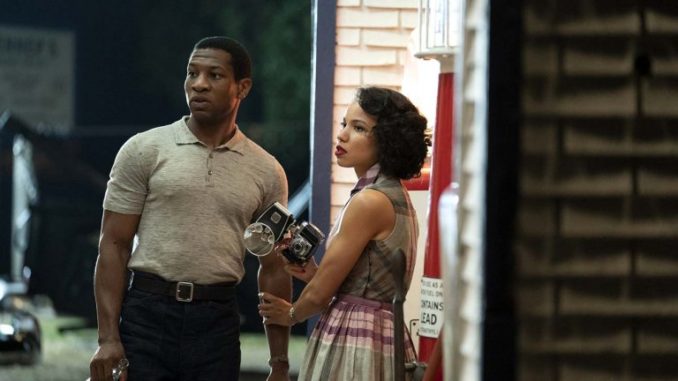
“There are themes in this show that resonate with us being Black Americans in 2020,” leading lady Smollett said of the series, which she described as “a show about family in search of family.” Lovecraft Country centers on Army vet and avid sci-fi reader Atticus Black (Majors), his friend Letitia Dandridge (Smollett), Uncle George (Vance) and Aunt Hippolyta (Ellis) as they search for Atticus’ father Montrose (Williams) in the Jim Crow South of 1955. The cast discussed the importance of Black leads within a genre where so many become early victims, and how Atticus, Letitia and George, as fans of sci-fi and horror, are a little better prepared from the monstrosities they face on their road trip.
Majors noted that when he was first given the script for Lovecraft Country, he was surprised by the fact that it was even written. Not only did he find it remarkable that the lead of a genre show was a Black man, but that he wasn’t the kind of character he’d seen before.
“You get to explore not just the archetypical ideas of what we tend to play,” he said. “He’s not just this soldier; that’s pretty common. He’s also a bibliophile. He gets to travel, he’s an adventurer … all of that was very apparent to me in the reading of the script.” It wasn’t just the internal nature of his character that Majors found interesting, he added, but also his place within the Black community, and what it means to be a son within that community.
This idea of familial place also extends to Letitia, who has a very tense relationship with her older sister, Ruby (Mosaku). Letitia, or “Leti” she’s more known, is part of the budding Civil Rights movement, but she hasn’t quite found her place yet. Because of her reputation as an instigator, something viewers get a sense of in the latest trailer (watch below), she’s found herself estranged from her family and in search of a “tribe.”
Mosaku said one of the most exciting challenges that came with the role of Ruby was working with Smollett in order to find the right vibe for the relationship between Leti and Ruby, so that their bond over music and frayed connection as sisters who had grown up together could be felt by the audience.
The familial conflicts highlighted in the show’s pilot are further tested by the arrival of one of the drama’s human villains, Christina Braithwhite (Lee), later in the season. Lee describes Christina as “the daughter of the leader of a secret order called the Sons of Adam. She’s the ultimate provocateur, the agent of chaos, the white antagonist … She’s the Karen.” Lee noted how the theme of white privilege was crucial to understanding her character and her role in the show, yet as a woman looking to escape the patriarchal ties of her family in the 1950s, there’s also a sympathetic quality to her “neglected, abused, and lonely” history.
Lovecraft Country goes to some dark very places, and several of the characters have interactions with police officers and “sundown towns” in the pilot episode that aren’t at all different from those happening between Blacks and cops today. Vance and Williams both detailed their own experiences with racism and their frustrations over the fact that America has made so little racial progress.
“I’m sick of it,” Vance said. “At what point are we going to say, ‘Enough is enough.’ We’ve got to reprogram the police.”
Williams elaborated on that point, sharing a “Karen” incident he’d endured with his family at a restaurant. “I try to have empathy for white fear. I don’t know what it is that makes people afraid of the color of skin,” Williams said, calling the issue with police as a symptom of a greater fear. Smollett said a lot of those feelings were taken into account within the show, and she called “tapping into that energy” a very dark place but necessary, while admitting that she could not have gone to those places without her castmates.
Despite the darkness of the show’s themes, Lovecraft Country is not without moments of humor, both on screen and behind the scenes. “[Black people] wouldn’t be here now if we couldn’t find the levity and humor in humanity,” said Majors. “And Black folks, we’re full human beings, and where there’s sorrow, there’s joy.”
One of the great joys was the environment on set created by Misha Green (WGN America’s late and great Underground), who was unavailable to participate in the pre-recorded panel. Vance said the showrunner handled the organized chaos that allowed the cast to take the space to feel like family. Majors backed that up, discussing the tightness of the cast and saying that even now he has trouble calling Courtney B. Vance by his name because he just thinks of him as Uncle George. And while the cast was tight-lipped about the monsters viewers would be seeing in the series, a few of which were teased in the latest trailer, they admitted they had a great time being “silly” reacting to the green screen and technical marks that would later become Lovecraftian creatures.
Lovecraft Country is horror with a strong social message. Fittingly, given Peele’s involvement, Williams said the series reminded him of The Twilight Zone, “the socially charged, mixed with the bizarre.” For him, the show’s monsters “represent everything that is dark and violent in society.” There’s plenty of mystery, terror, and adventure awaiting in Lovecraft Country, but the cast also hopes the show provides a means to confront certain realities about America and start conversations that allow audiences to process the very real horrors that still exist for Black Americans.

Be the first to comment